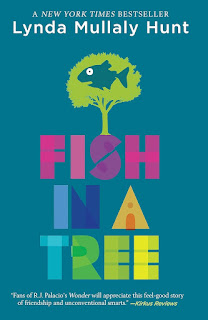Fish in a Tree by Lynda Mullaly Hunt
Rating: ⭐⭐⭐
My daughter's fourth grade class started Fish in a Tree at the end of the school year, but did not get a chance to finish it. I bought it for her as soon as I learned what what it's about. Knowing how much she loves realistic fiction about how kids who struggle navigate the world, it was a no-brainer.
Fish in a Tree is about a sixth grader named Ally who cannot read because she has dyslexia. She is highly intelligent and creative, but this struggle to read sometimes leaves her and her fellow students thinking she is stupid. She is also often labled as disruptive and lazy as she struggles with reading and writing and tries to mask her inabilities and insecurities. Eventually, Ally gets a teacher who recognizes her neurodivergence and her potential. She flourishes once she is finally seen by him.
Fish in a Tree highlights the ups and downs of a middle-grader's life as they discover who they are and what they are capable of. Ally struggles with friendships, but finds friends who are also often ostracized and called different. Overall, it is a good story that young readers will enjoy as they see themselves in the characters, especially if they relate to the specific struggles of Ally and her friends.
I found the story to be uplifting, but sometimes unrealistic. The story often buys into stereotypes of what children with neurodivergence look like or act like, and I wish the author would have found a way to combat those stereotypes instead. I still think this is a good book for pre-teens, but young readers would benefit from conversations with parents, caregivers, or teachers about how we can never assume things about people just based on the way that they look.
Additionally, I believe the story gives the false idea that once things start to improve, they will only go up. Ally still has some struggles after finding a new teacher, but all of her "wins" feel a little unrealistic. Resilience is not represented by a sudden increase in good things happening. Instead, it is found in learning how to cope through the struggles and building strength through those experiences.
Again, I still think this is a good book for the 9-12 year-old age group. I would just be sure to pair the reading with important conversations about neurodivergence, stereotypes, and resilience.
Help support independent bookstores and get your copy from bookshop.org. This is an affiliate link, meaning I get a commission if you decide to make a purchase through my link, at no cost to you.



Comments
Post a Comment